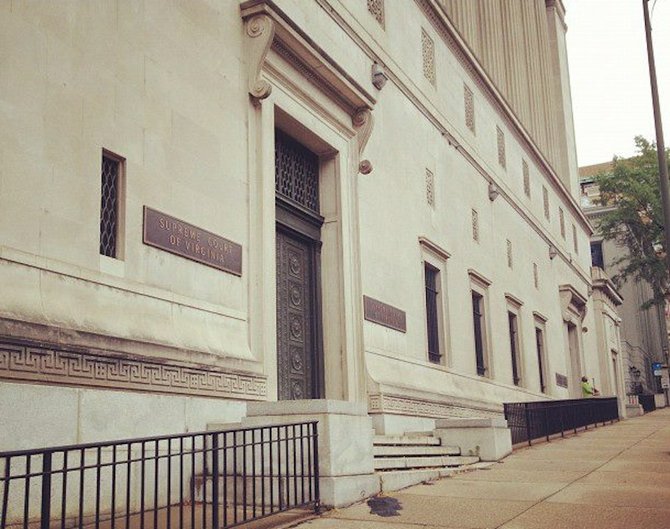No photographs, videos or audio recordings are allowed in the Virginia Supreme Court. Photo by Michael Lee Pope.
John Adams was president of the United States when two land owners on Wales Alley secured a deed that gave them private use to a 30-foot easement in the alley. Now that deed is at the heart of a legal dispute before the Virginia Supreme Court between city officials and the Old Dominion Boat Club. At issue is a lease agreement city leaders entered into with Virtue Feed and Grain that allows the restaurant to block part of the alley with tables and chairs. City Attorney James Banks told justices that the private easement was extinguished when the city started treating the alley as if it were a public street in the 1970s.
"It goes away by application of law when there is implied dedication," said Banks.
Banks seized on what he called the doctrine of implied dedication, a theory that the city essentially dedicated the alley a public street by actions if not by explicit action. Because city officials cleared snow, filled potholes and issued parking tickets, he argued, the private rights that date back to the 1789 deed was extinguished. Several of the justices were critical of the theory, though, and asked a number of pointed questions.
"Your argument is premised on something that is not correct," Chief Justice Cynthia Kinser told Banks. "You haven't told us how the easement gets swept up."
THE HISTORY of Wales Alley dates back to the earliest days of the city, a time before Alexandria became part of the District of Columbia. It was originally called Fitzgerald Alley in honor of Alexandria Mayor John Fitzgerald, one of the major landowners in the city. By 1786, people started calling it Wales Alley when Andrew Wales started selling beer there. Three years later, Fitzgerald and Maryland businessman Valentine Peers divided their holdings, securing a deed that allowed for "free use and passage of the several streets and alleys."
“They probably didn’t like working with each other on it,” speculated Andrew Carroll, attorney for Virtue Feed and Grain Restaurant, according to court documents. “So they said, ‘let’s split it,’ and they split it.”
Lawyers for the Old Dominion Boat Club say the city is perverting the charter provision granting authority of public land. Instead of making that land available to the public, they said, the city was doing the opposite — making it available to a restaurant and denying the public an opportunity to use it in the process. Arguing before justices, Boat Club lawyer David Chamowitz rejected the idea that Old Dominion somehow yielded its private property rights from the 1789 deed by not rejecting city crews filling potholes or issuing parking tickets.
"You wouldn't have a right to object to these things even if you want to," said Chamowitz.
ALTHOUGH THE BOAT CLUB and the city have been at odds with each other for decades, the latest dispute erupted in 2010 when the Alexandria City Council granted a special-use permit to Virtue that opened the door to a lease agreement to the restaurant. The Boat Club reacted by suing the city, saying it needed the road to get its boats to the launch at the eastern edge of its controversial waterfront parking lot — the source of lingering tension between the Boat Club and City Hall.
"The city has benefited one private landowner at the expense of another landowner," observed Justice Bill Mims. "It's not quite as lofty as making sure King Street is one way."
Banks tried to make the argument that the city essentially added the alley to the public inventory by providing services since 1972, when the Alexandria Corporation Court ruled that a business known as Dockside Sales did not have the right to block access to Wales Alley for retail inventory storage. Since that time, city workers have treated the alley as if it were a public road.
"The Boat Club has today what it has always had," said Banks, "reasonable and appropriate access to the parking lot."
But when the city attorney began outlining the familiar list of government responsibilities that are executed in the alley, one of the justices interjected.
"None of those are inconsistent with a 30-foot easement," observed Mims. "The city does not have carte blanche to run over private property interests."
LAST WEEK, city officials acknowledged they are considering using the power of eminent domain to accomplish its goals on the waterfront. A key provision of the waterfront plan says the city will "pursue eliminating the ODBC parking lot along The Strand, preferably through negotiation with the ODBC." One potential outcome of the ongoing negotiations is that the Wales Alley litigation might be included into some kind of global compromise that also includes the fate of the parking lot at the foot of King Street. But if this week's oral arguments are any indication, both sides are digging in for now.
"We do not need to guarantee a 30-foot easement," Banks concluded.
The Boat Club disagreed with the city's attempt to deprive them of the easement.
